| Red-crested turaco | |
|---|---|
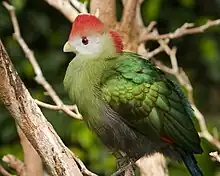 | |
| Red-crested turaco, Niagara Falls Aviary, Canada | |
| Scientific classification | |
| Domain: | Eukaryota |
| Kingdom: | Animalia |
| Phylum: | Chordata |
| Class: | Aves |
| Order: | Musophagiformes |
| Family: | Musophagidae |
| Genus: | Tauraco |
| Species: | T. erythrolophus |
| Binomial name | |
| Tauraco erythrolophus (Vieillot, 1819) | |
The red-crested turaco (Tauraco erythrolophus) is a turaco, a group of African otidimorph birds. It is a frugivorous bird endemic to western Angola. Its call sounds somewhat like a jungle monkey.
Description
The red-crested turaco weighs 210-325 g and is 45–50 cm long. It looks similar to the Bannerman's turaco, but differs in crest and face colors. Both sexes are similar.[2]
Behaviour
They are seen in flocks of up to 30 birds, or in pairs. They usually remain in trees, only coming down to eat or drink.[2]
Voice
A deep barking call. the female's call is slightly higher-pitched than the male's. They are highly vocal, particularly at dawn.[2]
Reproduction
Red-crested turacos are monogamous. Both mates build a flimsy nest 5 to 20 meters above the ground in dense foliage. After laying eggs, both birds incubate the eggs. The young leave the nest at 4–5 weeks old.[2]
As a national bird
The red-crested turaco is the national bird of Angola. It occurs quite commonly along the length of the Angolan escarpment and adjacent forested habitats.[3]
In media
A red-crested turaco was featured in 1998's The Parent Trap, as the bird pecking Meredith's chest shortly before she wakes up to discover Annie and Hallie have floated her camping mattress onto a lake. This scene of the film is set in Northern California, so the choice of this bird species is distinctly out of place.
Gallery
 At San Diego Zoo, U.S.
At San Diego Zoo, U.S.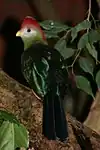 At Weltvogelpark Walsrode, Germany
At Weltvogelpark Walsrode, Germany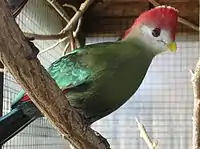 At Pombia Safari Park, Italy
At Pombia Safari Park, Italy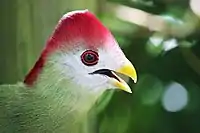 At Brevard Zoo, Florida
At Brevard Zoo, Florida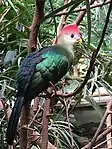 At Zoo Leipzig, Germany.
At Zoo Leipzig, Germany.
References
- ↑ BirdLife International (2016). "Tauraco erythrolophus". IUCN Red List of Threatened Species. 2016: e.T22688346A93193784. doi:10.2305/IUCN.UK.2016-3.RLTS.T22688346A93193784.en. Retrieved 13 November 2021.
- 1 2 3 4 "Red-crested Turaco". www.oiseaux-birds.com. Retrieved 2018-04-20.
- ↑ "Birds Angola - National Bird". www.birdsangola.org. Retrieved 2017-07-11.
